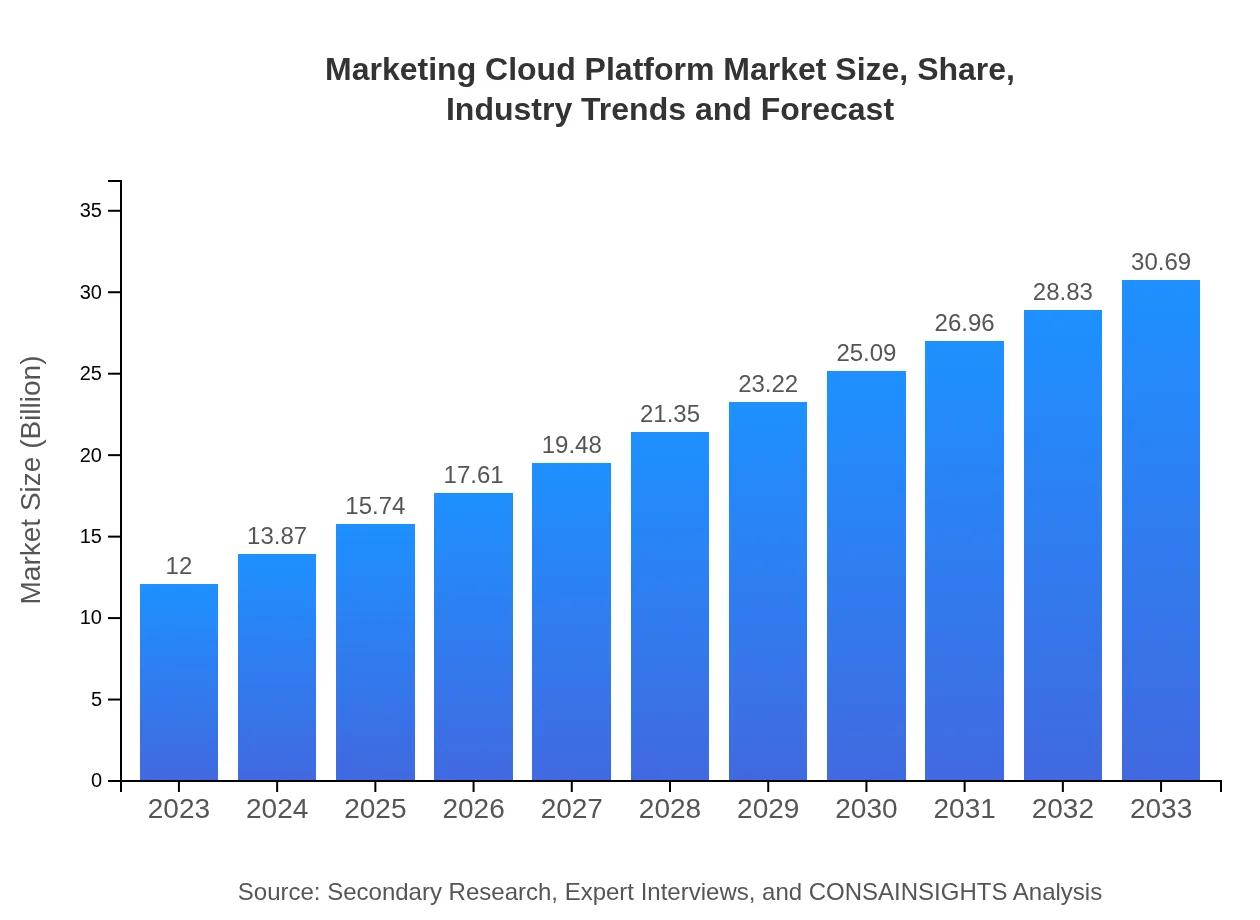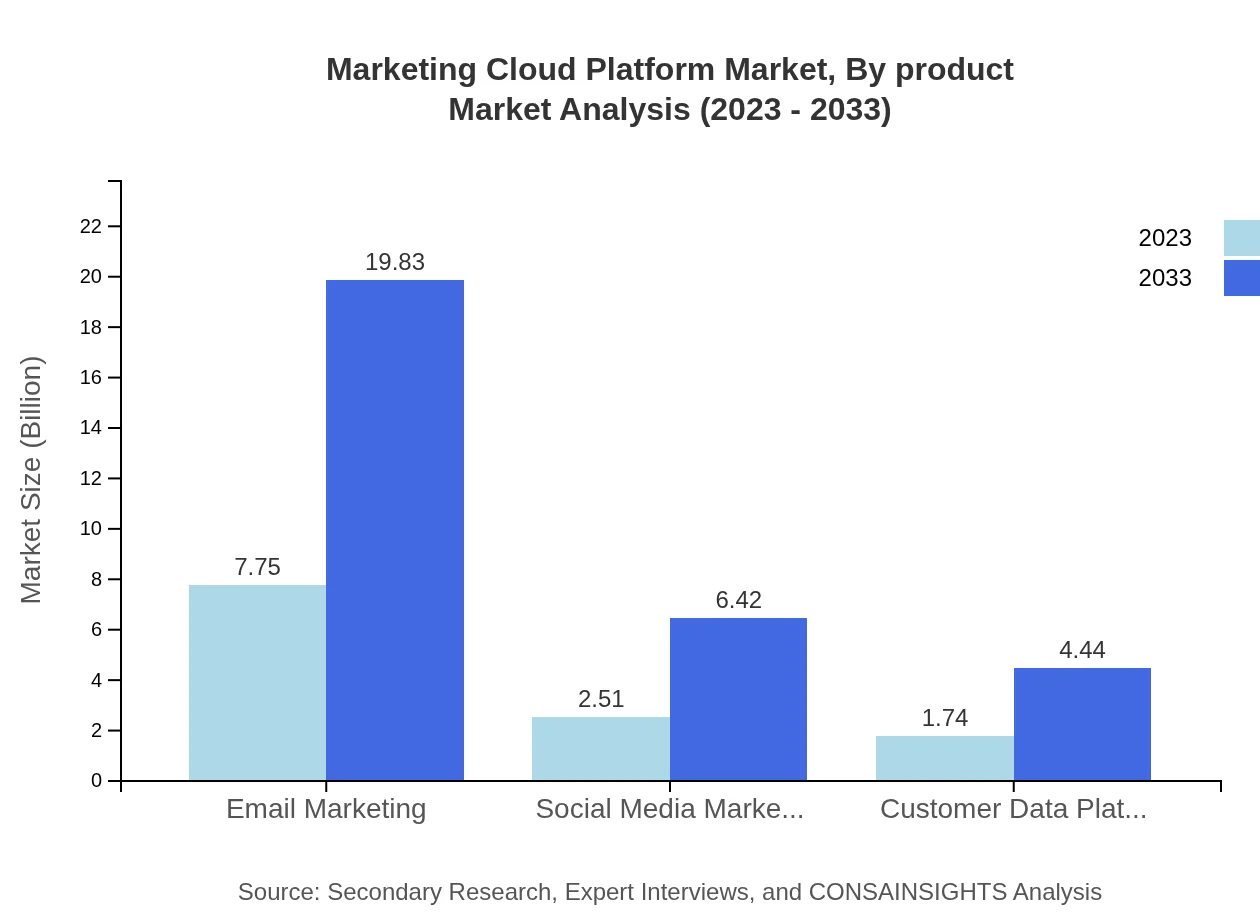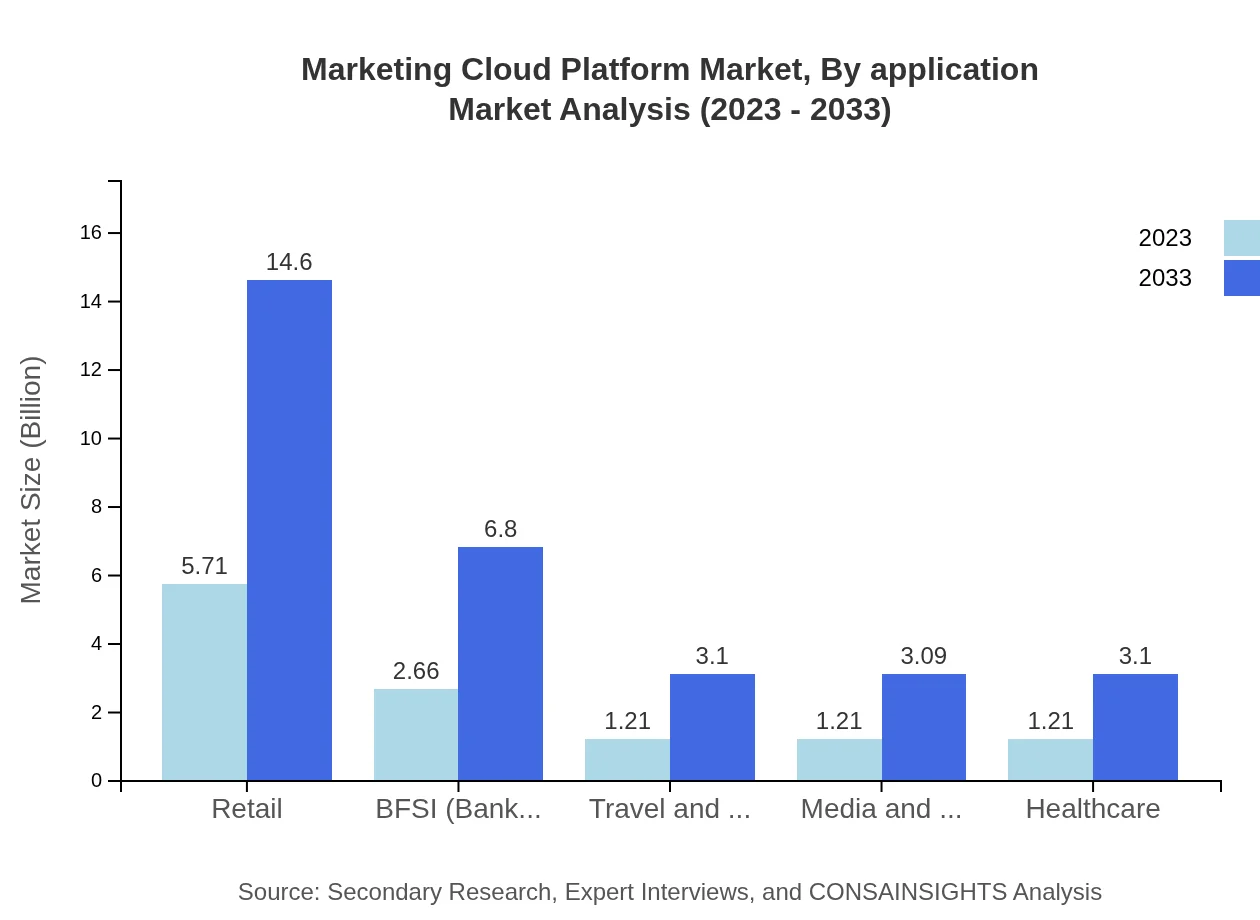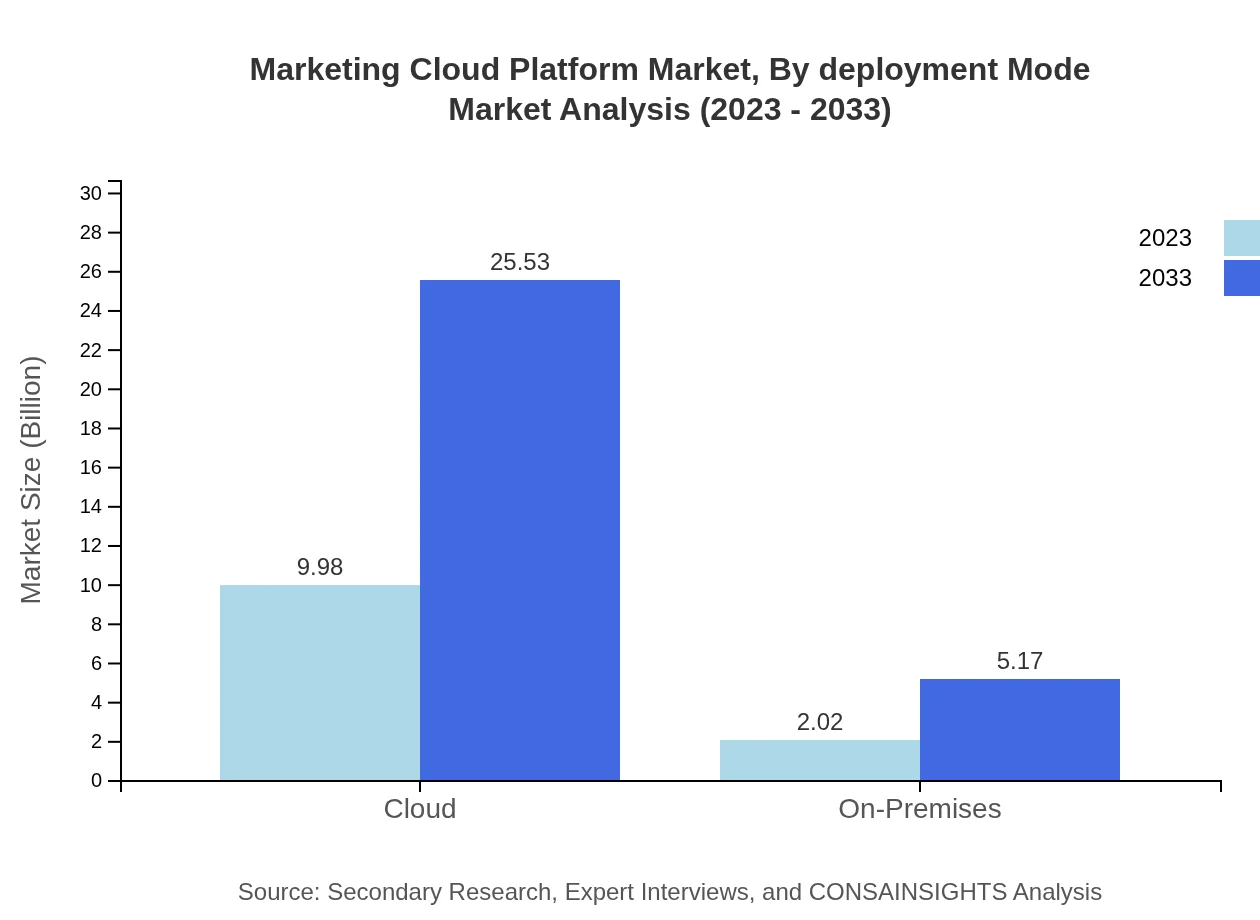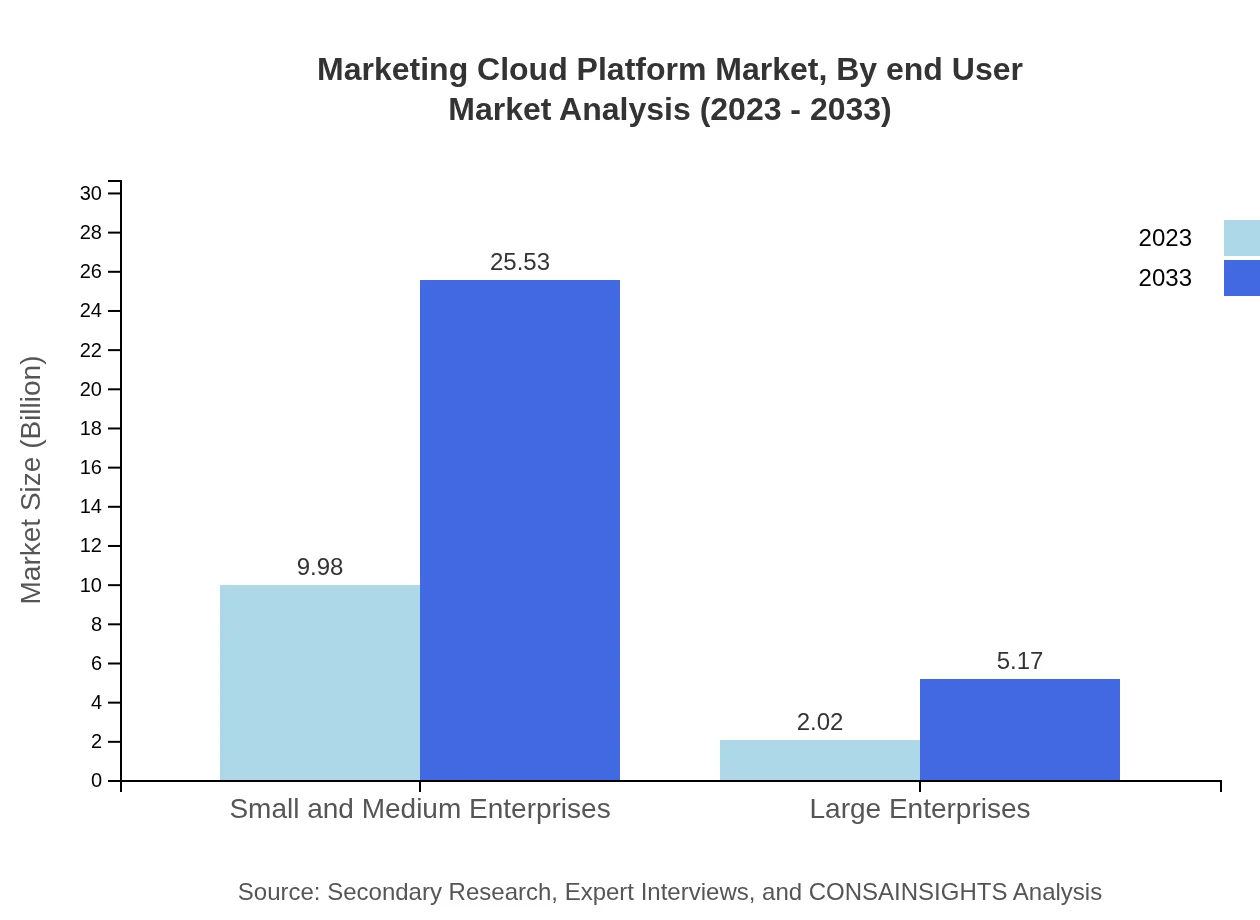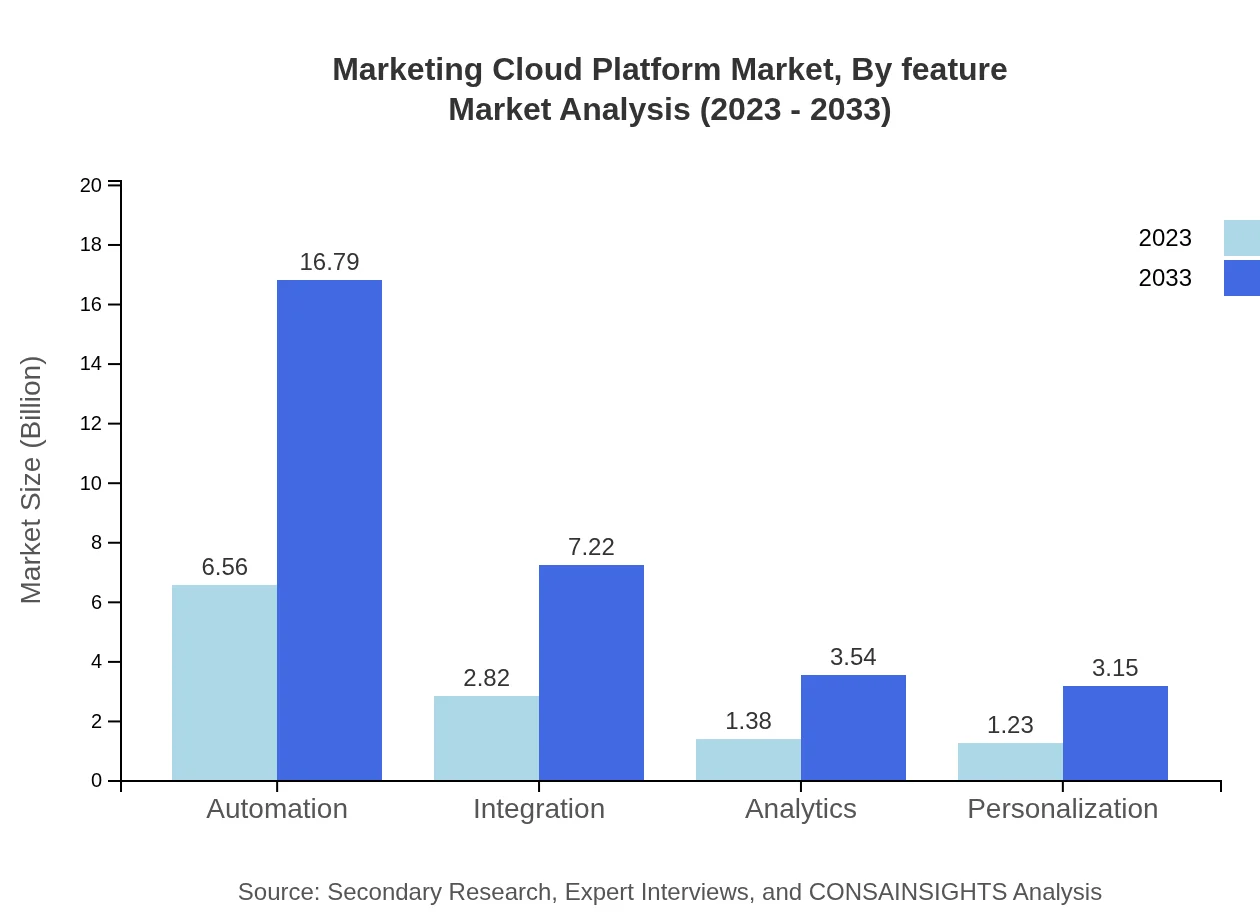Marketing Cloud Platform Market Report
Published Date: 31 January 2026 | Report Code: marketing-cloud-platform
Marketing Cloud Platform Market Size, Share, Industry Trends and Forecast to 2033
This report provides a comprehensive analysis of the Marketing Cloud Platform market from 2023 to 2033, offering key insights into market dynamics, size, growth trends, segmentation, and regional analyses to support strategic decision-making.
| Metric | Value |
|---|---|
| Study Period | 2023 - 2033 |
| 2023 Market Size | $12.00 Billion |
| CAGR (2023-2033) | 9.5% |
| 2033 Market Size | $30.69 Billion |
| Top Companies | Salesforce, Adobe, Oracle, HubSpot, SAP |
| Last Modified Date | 31 January 2026 |
Marketing Cloud Platform Market Overview
Customize Marketing Cloud Platform Market Report market research report
- ✔ Get in-depth analysis of Marketing Cloud Platform market size, growth, and forecasts.
- ✔ Understand Marketing Cloud Platform's regional dynamics and industry-specific trends.
- ✔ Identify potential applications, end-user demand, and growth segments in Marketing Cloud Platform
What is the Market Size & CAGR of Marketing Cloud Platform market in 2023?
Marketing Cloud Platform Industry Analysis
Marketing Cloud Platform Market Segmentation and Scope
Tell us your focus area and get a customized research report.
Marketing Cloud Platform Market Analysis Report by Region
Europe Marketing Cloud Platform Market Report:
The European market is set to grow from USD 3.24 billion in 2023 to USD 8.28 billion by 2033, driven by stringent regulations on data privacy which are pushing businesses to adopt compliant marketing solutions.Asia Pacific Marketing Cloud Platform Market Report:
In the Asia Pacific region, the marketing cloud platform market is projected to grow from USD 2.30 billion in 2023 to USD 5.88 billion by 2033, at a CAGR of around 10.00%. The region is witnessing a surge in e-commerce activities and digital marketing adoption, particularly in countries like India and China.North America Marketing Cloud Platform Market Report:
North America holds the largest share of the marketing cloud platform market, projected to grow from USD 4.56 billion in 2023 to USD 11.66 billion by 2033. The region's advanced technological infrastructure and a high concentration of major market players drive this growth.South America Marketing Cloud Platform Market Report:
The South American market for marketing cloud platforms is expected to expand from USD 0.67 billion in 2023 to USD 1.71 billion by 2033. Growth is driven by increasing internet penetration and a rise in digital marketing initiatives, albeit at a slower rate compared to other regions.Middle East & Africa Marketing Cloud Platform Market Report:
In the Middle East and Africa, the market for marketing cloud platforms will grow from USD 1.24 billion in 2023 to USD 3.16 billion by 2033. The growth is fueled by increased demand for digital marketing services and the adoption of cloud-based solutions across various industries.Tell us your focus area and get a customized research report.
Marketing Cloud Platform Market Analysis By Product
The Automation segment shows significant growth potential, anticipated to scale from USD 6.56 billion in 2023 to USD 16.79 billion in 2033, supported by the increasing emphasis on marketing efficiency. Other segments like Integration and Analytics are also witnessing growth, paving the way for a comprehensive suite of marketing tools.
Marketing Cloud Platform Market Analysis By Application
Email Marketing continues to dominate with a market size of USD 7.75 billion in 2023, expected to rise to USD 19.83 billion by 2033, making up 64.62% market share. Personalization and Customer Data Platforms are also gaining traction, as brands focus on delivering tailored customer experiences.
Marketing Cloud Platform Market Analysis By Deployment Mode
Cloud deployment accounts for the major share, growing from USD 9.98 billion in 2023 to USD 25.53 billion by 2033, with an impressive market share of 83.16%. On-Premises deployment is expected to rise as well but at a slower pace.
Marketing Cloud Platform Market Analysis By End User
The Small and Medium Enterprises sector is projected to grow substantially, increasing from USD 9.98 billion in 2023 to USD 25.53 billion by 2033, commanding a share of 83.16%. This trend illustrates how SMEs are adopting marketing technology to compete with larger firms.
Marketing Cloud Platform Market Analysis By Feature
The need for advanced Analytics and Integration features is becoming increasingly critical, especially as brands look to leverage comprehensive data insights to refine strategies and improve customer experiences.
Marketing Cloud Platform Market Trends and Future Forecast
Tell us your focus area and get a customized research report.
Global Market Leaders and Top Companies in Marketing Cloud Platform Industry
Salesforce:
A leading provider of cloud-based tools for marketing automation, CRM, and analytics, known for its comprehensive Marketing Cloud platform that supports personalized customer engagement.Adobe:
Known for its innovative solutions in digital marketing, Adobe's Marketing Cloud offers tools for data management, analytics, and personalization designed to enhance the customer journey.Oracle:
Offers a suite of cloud applications for marketing professionals, designed to help them manage customer relationships and marketing campaigns effectively.HubSpot:
Provides an all-in-one marketing platform that integrates marketing, sales, and customer service functionalities, aimed primarily at small to medium-sized enterprises.SAP:
SAP's Marketing Cloud helps drive personalized customer engagement and analyzes visitor behavior to optimize marketing strategies across various channels.We're grateful to work with incredible clients.









FAQs
What is the market size of marketing Cloud Platform?
The marketing cloud platform market is projected to grow from $12 billion in 2023 to significant heights by 2033, with an impressive CAGR of 9.5%. This growth reflects the increasing need for automated marketing solutions.
What are the key market players or companies in this marketing Cloud Platform industry?
Key players in the marketing cloud platform industry include Adobe, Salesforce, Oracle, HubSpot, and IBM. These companies are at the forefront, competing vigorously to innovate and capture market share.
What are the primary factors driving the growth in the marketing Cloud Platform industry?
The growth of the marketing cloud platform is driven by the rising demand for personalized marketing, increased digitalization, and the need for businesses to enhance customer experiences through data-driven insights and automation capabilities.
Which region is the fastest Growing in the marketing Cloud Platform?
North America leads as the fastest-growing region in the marketing cloud platform market, expanding from $4.56 billion in 2023 to $11.66 billion in 2033. Europe and Asia Pacific also show robust growth trajectories.
Does ConsaInsights provide customized market report data for the marketing Cloud Platform industry?
Yes, ConsaInsights offers customized market report data tailored to specific needs in the marketing cloud platform industry, providing personalized insights based on various market parameters and industries.
What deliverables can I expect from this marketing Cloud Platform market research project?
From the marketing cloud platform market research project, expect deliverables such as detailed market analysis reports, growth forecasts, competitive landscape assessments, consumer behavior insights, and segmentation data across regions and industries.
What are the market trends of marketing Cloud Platform?
Current trends in the marketing cloud platform industry include an increasing emphasis on AI-driven analytics, a surge in mobile marketing solutions, and rising investments in customer data platforms to enhance marketing effectiveness.

